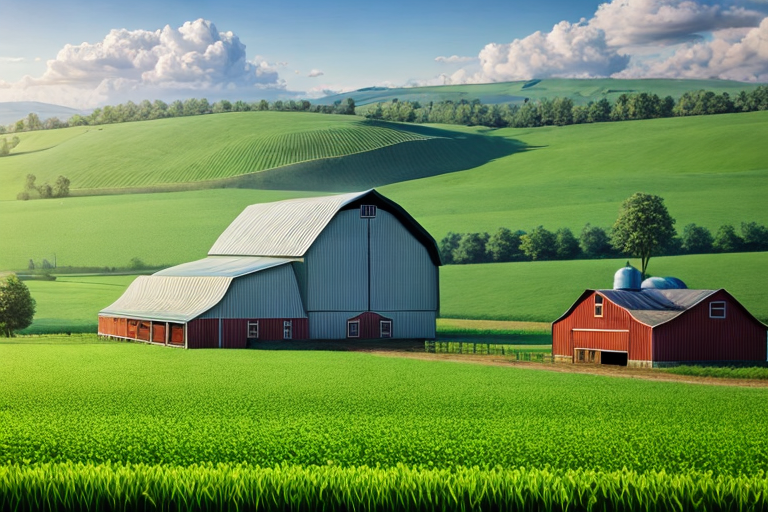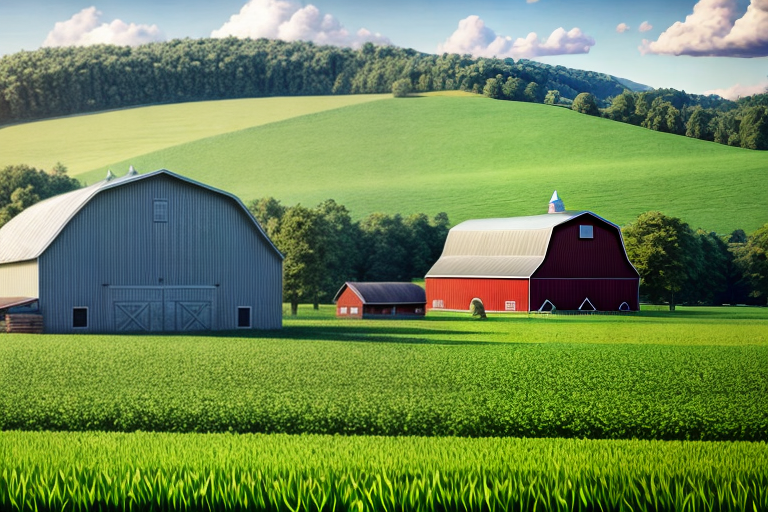
Livestock farming plays a crucial role in achieving self-sufficiency for farmers and ensuring a constant supply of various food products. By incorporating different types of animals like poultry, goats, and cattle, farmers can reduce their reliance on a single livestock species.
This not only increases resilience against disease outbreaks or market fluctuations but also benefits from the different ecological roles these animals play in maintaining a healthy farm ecosystem.
In addition to diversifying livestock species, micro farming techniques can also contribute significantly to self-sufficiency in livestock farming.
Implementing small-scale farming methods like rooftop gardens, vertical farming, or hydroponics allows farmers to maximize production within limited spaces. These practices enable year-round production and reduce the need for large land areas, making them ideal for urban or peri-urban farmers.
Ultimately, by embracing diverse livestock species and implementing micro farming techniques, farmers can achieve self-sufficiency in livestock farming, ensuring a sustainable and resilient food production system for the future.
Click here to learn more Survival Tips from Pro Outdoor Survival
Exploring Self Sufficiency through Livestock Farming
Exploring self-sufficiency through micro farming opens up endless opportunities for individual’s seeking a more sustainable and independent way of life. By engaging in small-scale animal husbandry practices such as backyard poultry keeping, pig rearing, goat herding, sheep raising, or cattle raising, you can take charge of your food production and reduce reliance on external sources.
The beauty of it lies in the ability to have complete control over the quality and safety of the nourishment you consume.
Self-sufficiency through micro farming offers economic advantages by saving costs on grocery bills and potentially generating income from surplus products.
Not to mention, the fulfilling experience brings you closer to nature and instills a sense of purpose.

small scale Farming Benefits for Sustainable Living
Although small-scale farming offers numerous benefits for sustainable living, it goes beyond just crops and plants. Another advantage is the opportunity to engage in rabbit farming, beekeeping, aquaponics, or hydroponics.
These practices not only provide additional food and income sources but also promote biodiversity and resource efficiency.
Small-scale farming encompasses various methods such as organic farming, regenerative farming, and permaculture.
This diversity allows individual’s to choose the approach that aligns best with their values and environmental goals, further enhancing the sustainability of their farming endeavors.
Small-Scale Farming
- Small-scale farming promotes biodiversity by providing habitats for various plant and animal species.
- Rabbit farming, beekeeping, aquaponics, and hydroponics in small-scale farming offer additional sources of food and income.
- Organic farming, regenerative farming, and permaculture are different methods within small-scale farming that allow individual’s to choose approaches aligned with their values and environmental goals.
- Engaging in small-scale farming practices like aquaponics and hydroponics can significantly improve resource efficiency by using less water and space compared to conventional farming methods.
Achieving Self Sufficiency with Urban Farming
Urban farming has become increasingly popular as people strive for self-sufficiency in today’s fast-paced world. With limited space available in urban areas, micro farming has emerged as a popular approach.
This method involves growing crops and raising animals on a small scale, allowing individual’s to maximize their limited space and produce a significant amount of food.
Raising animals, in particular, plays a crucial role in achieving self-sufficiency, providing a constant supply of protein-rich food.
Chickens, for example, are relatively easy to raise and provide a steady source of eggs. In addition to food production, urban farming encompasses other sustainable living practices such as composting and rainwater harvesting.
These techniques reduce waste, enrich the soil, and conserve water, further supporting a self-sufficient lifestyle.
Sustainable Farming Practices for MicroFarms
When it comes to sustainable farming practices for microfarms, incorporating farm animals is crucial. At [Business/Brand Name], we understand the benefits they bring.
Not only do they provide natural fertilizer production and weed control, but they also contribute to self-sufficiency by serving as a source of food and income.
To further support sustainability, organic and regenerative farming techniques are utilized.
These methods prioritize natural pest and disease control, avoiding synthetic chemicals and pesticides. Water conservation is also essential, with efficient irrigation systems and rainwater collection implemented to minimize waste and ensure water availability for crops and livestock.
Microfarms diversify their production through agroforestry and growing a variety of crops, reducing the risk of crop failure and promoting biodiversity while generating multiple income streams. Innovative techniques such as vertical farming, hydroponics, and aquaponics are also utilized to optimize space and maximize productivity.
| Sustainable Farming Practices at [Business/Brand Name] |
|---|
| Benefits of Incorporating Farm Animals: |
| – Natural fertilizer production |
| – Weed control |
| – Source of food and income |
| Organic and Regenerative Farming Techniques: |
| – Natural pest and disease control |
| – Avoidance of synthetic chemicals and pesticides |
| Water Conservation Methods: |
| – Efficient irrigation systems |
| – Rainwater collection to minimize waste |
| Microfarms Diversification Strategies: |
| – Agroforestry and growing a variety of crops |
| – Risk reduction of crop failure |
| – Promotion of biodiversity |
| Innovative Techniques: |
| – Vertical farming |
| – Hydroponics |
| – Aquaponics |
Homesteading for Self Sufficiency with Livestock and Farming
Homesteading for increased self-sufficiency and sustainable agriculture practices involves incorporating livestock into micro farming. This lifestyle choice promotes local food production and reduces reliance on store-bought produce.
Factors to consider when selecting livestock breeds for your homestead include climate suitability, feed requirements, and desired livestock products.
It is essential to choose appropriate livestock genetics and implement strategic livestock reproduction to maintain healthy and productive herds.
Understanding the livestock market and consumer demand can inform sustainable farming practices that align with your homesteading goals.
The Role of Poultry Farming in Self Sufficiency
Poultry farming is essential for achieving self-sufficiency in food production. By focusing on poultry, individual’s and communities can ensure a consistent supply of eggs and meat, reducing their dependence on external sources.
Unlike larger livestock operations, poultry farming requires less space and resources, making it suitable for small-scale farming.
This makes it an ideal choice for those with limited land or resources, enabling them to engage in self-sufficient food production on a smaller scale.
Poultry farming offers a quick turnaround time, with chickens reaching maturity within a few months, allowing individual’s to maintain a steady supply of poultry products. Poultry farming provides a diverse range of products, including eggs, meat, feathers, and even natural fertilizers from their manure.
This versatility maximizes the benefits of poultry farming and contributes to self-sufficiency in food production.
Poultry Farming
- Poultry farming contributes to self-sufficiency in food production.
- Poultry farming requires less space and resources compared to larger livestock operations.
- Poultry farming offers a quick turnaround time, with chickens reaching maturity within a few months.
- Poultry farming provides a diverse range of products, including eggs, meat, feathers, and natural fertilizers.
Utilizing Goat Farming for self sustaining MicroFarms
With the rising fascination in sustaining small-scale farms, goat farming has become a highly efficient and environmentally friendly method. In contrast to larger farming practices, goat farming necessitates less labor and equipment, making it accessible to those with limited resources.
By incorporating goats, small-scale farmers can guarantee a steady income through meat and dairy production while also decreasing expenses by reducing reliance on synthetic fertilizers.
Goat farming supports sustainable practices by effectively managing pastureland and naturally controlling weeds.
This contributes to the overall resources of the farm and enhances the long-term viability of self-sustaining small-scale farms.
Sheep Farming for Self Sufficiency A Practical Guide
Sheep farming offers a multitude of benefits for individual’s seeking self-sufficiency and a sustainable lifestyle. With a constant supply of meat, milk, and wool, sheep not only contribute to the overall resources of the farm but also provide a source of income.
This practical guide aims to equip aspiring farmers with the necessary knowledge to start their own sheep farm and enhance their self-reliance.
Topics covered include breeding, feeding, and caring for sheep, managing pastures, constructing shelters, preventing diseases, and maximizing productivity through micro farming practices.
This guide emphasizes the interconnectedness of self-sufficiency, showcasing how sheep farming can complement other agricultural practices such as vegetable gardening or beekeeping. Throughout your journey in sheep farming, it is crucial to consider aspects such as farm education, community, sustainability, advocacy, regulations, insurance, grants, and loans.
By following this guide, you will be well-prepared to embark on your sheep farming adventure.
Benefits of Sheep Farming
- Sheep farming provides a constant supply of meat, milk, and wool, contributing to the overall resources of the farm.
- Sheep farming offers a source of income through the sale of meat, milk, wool, and other sheep-related products.
- Sheep farming promotes self-sufficiency and a sustainable lifestyle by providing essential resources for individual’s.
- Sheep farming can complement other agricultural practices such as vegetable gardening or beekeeping, creating an interconnected and diverse farming system.
Off Grid Cooking Faster, Efficient
Building a self sustaining homestead Ultimate guide








